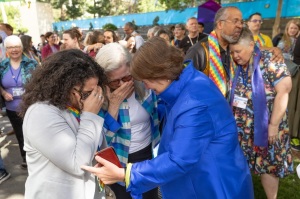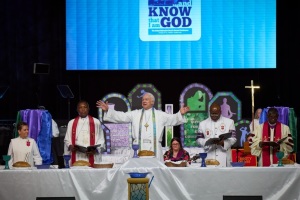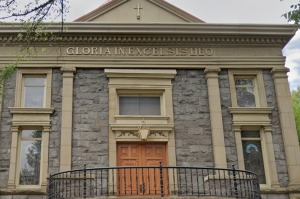Complete Text of Remarks by President Barack Obama to the United Nations General Assembly 2014
The good news is we also see signs that this tide could be reversed. We have a new, inclusive government in Baghdad; a new Iraqi Prime Minister welcomed by his neighbors; Lebanese factions rejecting those who try to provoke war. And these steps must be followed by a broader truce. Nowhere is this more necessary than Syria.
Together with our partners, America is training and equipping the Syrian opposition to be a counterweight to the terrorists of ISIL and the brutality of the Assad regime. But the only lasting solution to Syria's civil war is political -- an inclusive political transition that responds to the legitimate aspirations of all Syrian citizens, regardless of ethnicity, regardless of creed.
Cynics may argue that such an outcome can never come to pass. But there is no other way for this madness to end -- whether one year from now or ten. And it points to the fact that it's time for a broader negotiation in the region in which major powers address their differences directly, honestly, and peacefully across the table from one another, rather than through gun-wielding proxies. I can promise you America will remain engaged in the region, and we are prepared to engage in that effort.
My fourth and final point is a simple one: The countries of the Arab and Muslim world must focus on the extraordinary potential of their people -- especially the youth.
And here I'd like to speak directly to young people across the Muslim world. You come from a great tradition that stands for education, not ignorance; innovation, not destruction; the dignity of life, not murder. Those who call you away from this path are betraying this tradition, not defending it.
You have demonstrated that when young people have the tools to succeed -- good schools, education in math and science, an economy that nurtures creativity and entrepreneurship -- then societies will flourish. So America will partner with those that promote that vision.
Where women are full participants in a country's politics or economy, societies are more likely to succeed. And that's why we support the participation of women in parliaments and peace processes, schools and the economy.
If young people live in places where the only option is between the dictates of a state, or the lure of an extremist underground, then no counterterrorism strategy can succeed. But where a genuine civil society is allowed to flourish -- where people can express their views, and organize peacefully for a better life -- then you dramatically expand the alternatives to terror.
And such positive change need not come at the expense of tradition and faith. We see this in Iraq, where a young man started a library for his peers. "We link Iraq's heritage to their hearts," he said, and "give them a reason to stay." We see it in Tunisia, where secular and Islamist parties worked together through a political process to produce a new constitution. We see it in Senegal, where civil society thrives alongside a strong democratic government. We see it in Malaysia, where vibrant entrepreneurship is propelling a former colony into the ranks of advanced economies. And we see it in Indonesia, where what began as a violent transition has evolved into a genuine democracy.
Now, ultimately, the task of rejecting sectarianism and rejecting extremism is a generational task -- and a task for the people of the Middle East themselves. No external power can bring about a transformation of hearts and minds. But America will be a respectful and constructive partner. We will neither tolerate terrorist safe havens, nor act as an occupying power. We will take action against threats to our security and our allies, while building an architecture of counterterrorism cooperation. We will increase efforts to lift up those who counter extremist ideologies and who seek to resolve sectarian conflict. And we will expand our programs to support entrepreneurship and civil society, education and youth -- because, ultimately, these investments are the best antidote to violence.
We recognize as well that leadership will be necessary to address the conflict between Palestinians and Israelis. As bleak as the landscape appears, America will not give up on the pursuit of peace. Understand, the situation in Iraq and Syria and Libya should cure anybody of the illusion that the Arab-Israeli conflict is the main source of problems in the region. For far too long, that's been used as an excuse to distract people from problems at home. The violence engulfing the region today has made too many Israelis ready to abandon the hard work of peace. And that's something worthy of reflection within Israel.
Because let's be clear: The status quo in the West Bank and Gaza is not sustainable. We cannot afford to turn away from this effort -- not when rockets are fired at innocent Israelis, or the lives of so many Palestinian children are taken from us in Gaza. So long as I am President, we will stand up for the principle that Israelis, Palestinians, the region and the world will be more just and more safe with two states living side by side, in peace and security.
So this is what America is prepared to do: Taking action against immediate threats, while pursuing a world in which the need for such action is diminished. The United States will never shy away from defending our interests, but we will also not shy away from the promise of this institution and its Universal Declaration of Human Rights -- the notion that peace is not merely the absence of war, but the presence of a better life.
I realize that America's critics will be quick to point out that at times we too have failed to live up to our ideals; that America has plenty of problems within its own borders. This is true. In a summer marked by instability in the Middle East and Eastern Europe, I know the world also took notice of the small American city of Ferguson, Missouri -- where a young man was killed, and a community was divided. So, yes, we have our own racial and ethnic tensions. And like every country, we continually wrestle with how to reconcile the vast changes wrought by globalization and greater diversity with the traditions that we hold dear.
But we welcome the scrutiny of the world -- because what you see in America is a country that has steadily worked to address our problems, to make our union more perfect, to bridge the divides that existed at the founding of this nation. America is not the same as it was 100 years ago, or 50 years ago, or even a decade ago. Because we fight for our ideals, and we are willing to criticize ourselves when we fall short. Because we hold our leaders accountable, and insist on a free press and independent judiciary. Because we address our differences in the open space of democracy -- with respect for the rule of law; with a place for people of every race and every religion; and with an unyielding belief in the ability of individual men and women to change their communities and their circumstances and their countries for the better.
After nearly six years as President, I believe that this promise can help light the world. Because I have seen a longing for positive change -- for peace and for freedom and for opportunity and for the end to bigotry -- in the eyes of young people who I've met around the globe.
They remind me that no matter who you are, or where you come from, or what you look like, or what God you pray to, or who you love, there is something fundamental that we all share. Eleanor Roosevelt, a champion of the UN and America's role in it, once asked, "Where, after all, do universal human rights begin? In small places," she said, "close to home -- so close and so small that they cannot be seen on any maps of the world. Yet they are the world of the individual person; the neighborhood he lives in; the school or college he attends; the factory, farm or office where he works."
Around the world, young people are moving forward hungry for a better world. Around the world, in small places, they're overcoming hatred and bigotry and sectarianism. And they're learning to respect each other, despite differences.
The people of the world now look to us, here, to be as decent, and as dignified, and as courageous as they are trying to be in their daily lives. And at this crossroads, I can promise you that the United States of America will not be distracted or deterred from what must be done. We are heirs to a proud legacy of freedom, and we're prepared to do what is necessary to secure that legacy for generations to come. I ask that you join us in this common mission, for today's children and tomorrow's.
Thank you very much. (Applause.)
Transcript courtesy of the White House




























